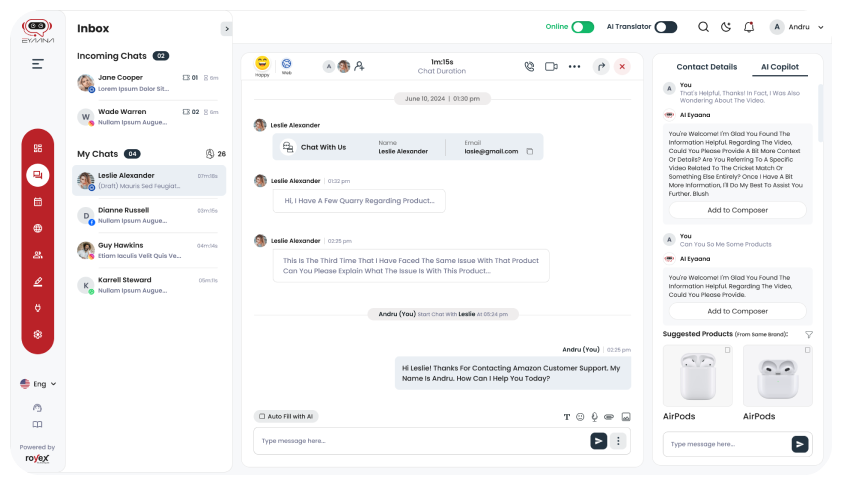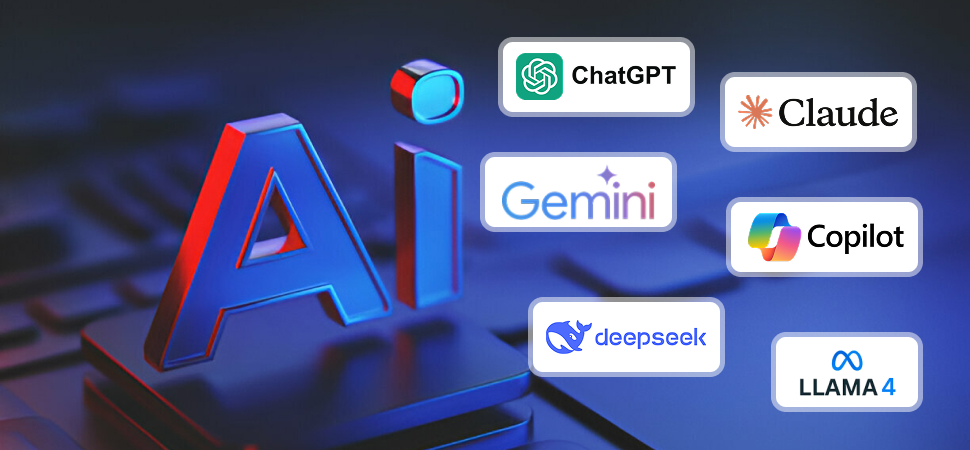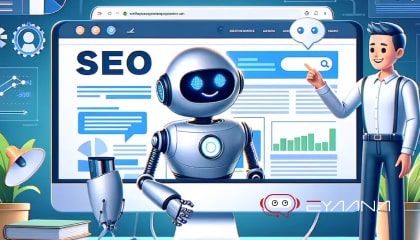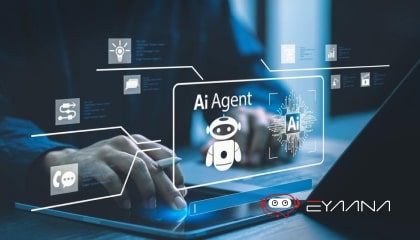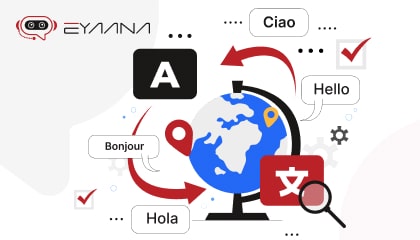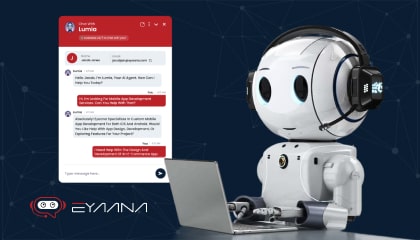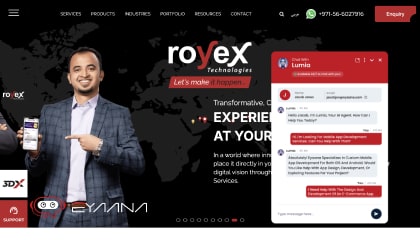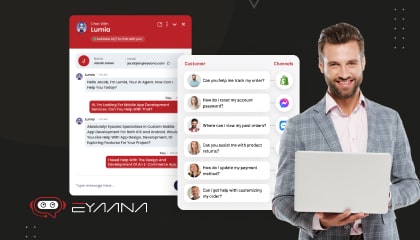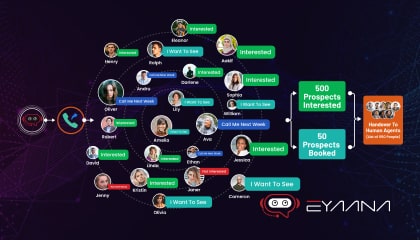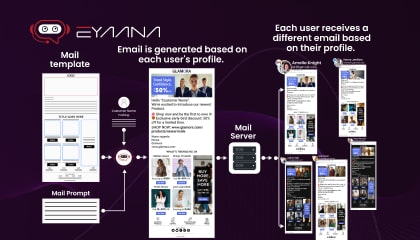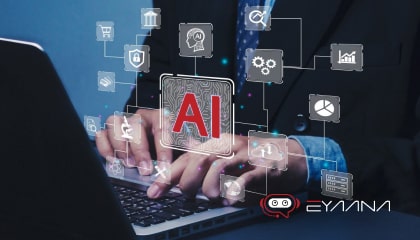Enquiry
Blog Details
The High Cost of Ignoring AI: What Happens When Businesses Don't Adapt?
By 2030, an estimated 70% of global companies will have integrated AI into their business operations, with another 20% actively exploring its potential. This rapid adoption aligns with the broader trend of AI-driven transformation, as the global AI market is expected to surpass $1.5 trillion, growing at an annual rate of 40%. Despite these advancements, many businesses still hesitate to embrace AI fully, putting themselves at a competitive disadvantage.
So, what exactly happens when businesses don't adapt to AI?
1. Loss of Competitive Edge and Market Share
![loss-of-competitive-edge-and-market-share-min[1].jpg](/media/t5kf4jw2/loss-of-competitive-edge-and-market-share-min-1.jpg)
Businesses that fail to adopt AI risk falling behind their competitors. AI enables companies to analyze vast amounts of data, automate processes, and deliver personalized experiences at scale. If your competitors are leveraging AI-driven insights while you rely on outdated methods, you’ll struggle to keep up. Think about Amazon’s recommendation engine—it’s powered by AI and generates a significant portion of its revenue by personalizing customer experiences. Businesses that fail to implement similar strategies risk losing customers to more tech-savvy competitors.
-
Efficiency and Automation: AI-powered automation streamlines processes, reduces errors, and increases output. Businesses that fail to adopt these technologies will struggle to compete with those that can produce goods and services faster and at lower costs. Competitors leveraging AI for process optimization, supply chain management, and customer service will gain a substantial edge.
-
Data-Driven Insights: AI excels at analyzing vast datasets to uncover valuable insights. Businesses that ignore AI risk missing critical market trends, customer preferences, and operational inefficiencies. This lack of data-driven decision-making can lead to poor strategic choices and missed opportunities.
-
Personalized Customer Experiences: AI enables businesses to create highly personalized experiences for their customers. From tailored product recommendations to proactive customer support, AI-driven personalization enhances customer satisfaction and loyalty. Businesses that rely on generic, one-size-fits-all approaches will find it increasingly difficult to retain customers.
2. Increased Operational Inefficiencies and Costs
-
Manual Processes: Relying on manual processes in an AI-driven world leads to increased labor costs, slower turnaround times, and higher error rates. AI can automate repetitive tasks, freeing up human resources for more strategic and creative work.
-
Ineffective Resource Allocation: Without AI-powered analytics, businesses struggle to optimize resource allocation. This can result in overspending on inventory, inefficient marketing campaigns, and underutilization of assets.
-
Reactive vs. Proactive Problem Solving: AI can predict potential problems before they occur, allowing businesses to take proactive measures. Without AI, businesses are forced to react to problems after they arise, leading to costly disruptions and downtime.
3. Talent Acquisition and Retention Challenges
Today’s workforce values innovation and growth opportunities. Companies that resist adopting AI risk losing top talent who seek environments where they can work with cutting-edge tools and develop new skills. Key points include:
-
Skills Gap: The demand for AI skills is rapidly outpacing the supply. Businesses that fail to invest in AI training and development will struggle to attract and retain top talent.
-
Employee Morale: Employees in companies that resist technological advancement may feel stagnant and unmotivated. They may perceive their company as outdated and less competitive, leading to decreased morale and higher turnover.
-
Attracting Tech-Savvy Professionals: The modern workforce, particularly younger generations, expects to work with cutting-edge technologies. Businesses that ignore AI will find it difficult to attract and retain tech-savvy professionals who are eager to work with innovative tools.
4. Increased Security Risks
![increased-security-risks-min[1].jpg](/media/m53gfkdn/increased-security-risks-min-1.jpg)
-
Cybersecurity Vulnerabilities: AI-powered cybersecurity solutions can detect and prevent sophisticated cyberattacks. Businesses that rely on traditional security measures are more vulnerable to breaches and data loss.
-
Fraud Detection: AI can analyze transaction patterns and identify fraudulent activities in real-time. Businesses that ignore AI risk falling victim to financial fraud and reputational damage.
-
Data Privacy Concerns: AI systems, when implemented correctly, can also help to protect sensitive data. Conversely, a lack of modern security systems, including AI, can increase the risk of data breaches.
5. Stunted Innovation and Growth
-
Limited Research and Development: AI can accelerate research and development by analyzing vast amounts of data and identifying patterns that humans might miss. Businesses that ignore AI will struggle to innovate and bring new products and services to market.
-
Missed Opportunities: AI can identify emerging trends and opportunities that businesses might otherwise overlook. Ignoring AI can lead to missed opportunities for growth and expansion.
-
Slower Time-to-Market: AI-powered automation and analytics can significantly reduce the time it takes to develop and launch new products and services. Businesses that ignore AI will face longer development cycles and slower time-to-market.
6. Decline in Decision-Making Quality
AI excels at processing vast amounts of data to provide actionable insights. Companies that fail to adopt AI tools often rely on outdated methods for decision-making, which can lead to slower responses and costly errors. For instance:
-
Large organizations frequently struggle with timely decision-making due to the complexity of their operations. AI can streamline this process by offering real-time insights.
-
Businesses without AI may face increased costs and reduced productivity as they miss opportunities for optimization.
7. Reduced Innovation and Agility
AI fosters innovation by enabling businesses to experiment with new ideas, products, and services while adapting quickly to market changes. Companies that neglect AI may find themselves unable to pivot effectively in response to disruptions or emerging opportunities:
-
Adaptive AI systems allow businesses to respond dynamically to changing conditions, such as shifting consumer demands or supply chain disruptions.
-
Without AI, organizations risk stagnation as competitors outpace them with faster innovation cycles.
8. Financial Risks and Missed Opportunities
Ignoring AI can lead to direct financial losses:
-
Companies that fail to integrate AI into their operations may face inefficiencies, higher costs, and reduced profitability.
-
A McKinsey study revealed that 70% of companies report minimal impact from their AI initiatives due to poor implementation—highlighting the importance of a robust strategy.
Moreover, businesses that treat AI as a one-off project rather than an ongoing initiative risk wasting resources on ineffective implementations.
9. Exposure to Ethical and Reputational Risks
While adopting AI comes with challenges like managing biases or ensuring ethical use, ignoring these issues entirely can be even more damaging:
-
Companies that avoid AI may lack the tools needed to monitor risks like fraud or cybersecurity threats effectively.
-
Failing to address ethical concerns proactively could lead to reputational damage when issues arise.
10. Inability to Scale Operations
AI is essential for scaling operations efficiently. Businesses that neglect this technology often find themselves limited by outdated processes:
-
For example, scaling customer service without AI-powered chatbots or recommendation systems can lead to inefficiencies and poor customer experiences.
-
Neglecting infrastructure requirements for AI adoption further hampers growth potential.
How Businesses Can Adapt
To avoid these pitfalls, companies must take proactive steps toward integrating AI into their strategies:
-
Invest in Workforce Training: Equip employees with the skills needed to work alongside AI tools effectively.
-
Develop a Clear Strategy: Treat AI as an ongoing initiative rather than a one-time project.
-
Focus on Ethical Use: Address concerns around bias, privacy, and transparency from the outset.
-
Allocate Resources Wisely: Ensure sufficient investment in technology, talent, and infrastructure.
-
Embrace Adaptive Systems: Use adaptive AI models that evolve with changing business needs.
Conclusion: Adapt or Be Left Behind
Ignoring AI is not just a missed opportunity—it’s a direct path to obsolescence. Businesses that fail to adapt will find themselves struggling to compete, losing customers, and spending more on inefficient operations. AI is not a luxury; it’s a necessity for survival in today’s fast-paced business world.
The good news? It’s never too late to start embracing AI. Whether it’s implementing AI-driven chatbots, automating processes, or enhancing cybersecurity, even small steps can make a significant impact. The choice is simple: adapt and thrive, or resist and risk being left behind.
Why Eyaana is the Best Choice for AI Chatbot?
![why-eyaana-is-the-best-choice-min[1].jpg](/media/iz0dvyta/why-eyaana-is-the-best-choice-min-1.jpg)
If you’re looking for a powerful yet user-friendly ai chatbot, Eyaana is worth considering. With Eyaana, businesses can seamlessly turn website traffic into live, engaging conversations, making it easier to convert leads into customers.
Eyaana is designed to be an AI-first customer support and sales solution, meaning it comes with powerful automation features, yet it’s easy to use even for non-technical teams. Its inbuilt CRM and helpdesk make customer management simple, while its AI-driven chat capabilities provide a smart, personalized experience for users.
Inbuilt CRM and Helpdesk: Eyaana comes with a built-in CRM and helpdesk, allowing businesses to manage customer data and support interactions in one place.
Flexible Pricing: Choose from Eyaana’s Lite and Pro packages starting from $99/month, with flexible, commitment-free tiers tailored to suit businesses of all sizes.
Multilingual Support: Engage a diverse audience with language options like Arabic, English, Hindi, and Urdu.
AI-First Design: Eyaana’s chatbot learns over time, enhancing customer interactions and turning site visits into conversations.
Scalability: Eyaana adapts to business growth, handling higher customer interactions with ease.
24/7 Support & Analytics: Real-time data and round-the-clock support help improve customer experiences.
For businesses looking to implement 24/7 customer support, Eyaana offers an excellent solution. With advanced AI capabilities, Eyaana is designed to provide fast, accurate, and personalized customer service around the clock. By choosing Eyaana, businesses can ensure that their customers are always taken care of, without needing to rely on human agents for every single inquiry. Whether it’s for answering questions, troubleshooting issues, or processing orders, Eyaana can help businesses deliver seamless 24/7 support with ease.
To explore how AI can enhance your business operations, sign up for free and get started with Eyaana today.
Do you need help?
We will provide detailed information about our services, types of work, and top projects. We will calculate the cost and prepare a commercial proposal.
